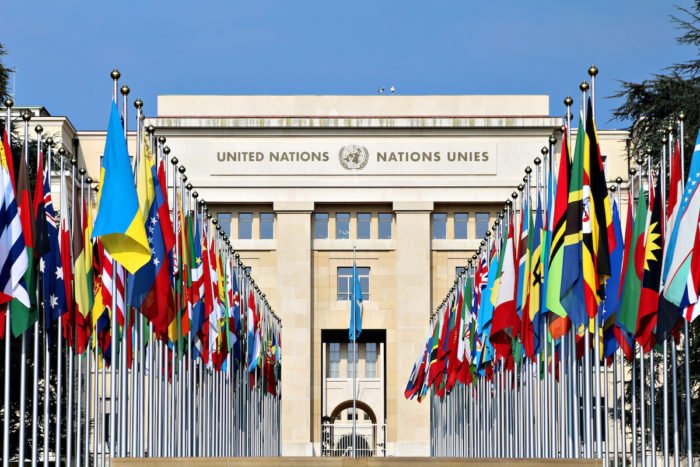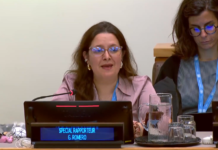
In its official response to a joint UN letter on the retrial of the country’s Reporters Without Borders (RSF) representative and journalist Erol Önderoğlu, the Turkish government claimed that no one is being subjected to investigation or prosecution for solely their journalistic activities in Turkey.
“There are no convicts and detainees held in penal institutions merely for press activities,” said Turkish government in its diplomatic communiqué, conveyed by the country’s permanent mission to the UN office in Geneva, via a note verbale dated April 30, adding that Önderoğlu was “charged with making propaganda of a terrorist organization, public incitement to commit crime and praising criminals under Anti-Terror Law, Penal Code and Press Law.”
Turkey’s letter comes at time when recent indexes and reports released by prominent right organizations have shown the country as one of the world’s top jailers of journalists and writers.
The 51-year-old Önderoğlu is being tried together with journalist Ahmet Nesin and Şebnem Korur Fincancı of the Human Rights Foundation of Turkey. They face almost 15 years’ imprisonment for joining a campaign to support the Özgür Gündem newspaper, which was shut down after a coup attempt in July 2016.
The three were acquitted of charges of “propagating terrorism” in 2019. An appeals court overturned that ruling last November and ordered a new trial.
Özgür Gündem fell victim to a vicious crackdown President Recep Tayyip Erdoğan unleashed against opposition media and his political rivals after he survived the failed coup.
UN special rapporteurs in a joint letter sent to the Turkish government on March 1 expressed serious concern about “the renewed judicial harassment and recycled terrorism-related charges brought against” Önderoğlu, for his one-day symbolic participation in a campaign in support of Özgür Gündem in 2016.
The UN letter was sent by UN rapporteurs Irene Khan, special rapporteur on the promotion and protection of the right to freedom of opinion and expression; Elina Steinerte, vice-chair of the Working Group on Arbitrary Detention; Clement Nyaletsossi Voule, special rapporteur on the rights to freedom of peaceful assembly and of association; Mary Lawlor, special rapporteur on the situation of human rights defenders; and Fionnuala Ní Aoláin, special rapporteur on the promotion and protection of human rights and fundamental freedoms while countering terrorism.
“We are also concerned that this case may be representative of a seemingly deliberate and systematic pattern of judicial persecution of journalists and human rights defenders in Turkey, as well as what appears to be a deteriorating environment in regard to media freedom more generally,” the UN officials said.
In its diplomatic letter to the UN, the Turkish government argued that “some convicts and detainees who claim to be press employees, do not actually possess press credentials or have relevant records registered to the authorities, and are falsely presented as members of the press.”
The Turkish government controls 90 percent of the Turkish media by means of regulators, while the Press Advertising Council, an agency that allocates state advertising, and the Presidential Directorate for Communications, which issues press cards, use clearly discriminatory practices in order to increase the pressure on media and journalists.
In response to a question by deputy chairperson of the main opposition Republican People’s Party (CHP) Gülizar Biçer Karaca, the presidential directorate said it had refused to renew the press cards of 1,371 journalists and that 1,238 press cards were cancelled between December 14, 2018 and December 31, 2020.
Turkey was ranked 153rd among 180 countries in the 2021 World Press Freedom Index released by Reporters Without Borders (RSF) in April.
According to the Stockholm Center for Freedom’s “Jailed and Wanted Journalists in Turkey” database, 174 journalists are behind bars in Turkey and 167 are wanted and either in exile or at large.
In its annual report, the Committee to Protect Journalists (CPJ) underlined that the number of journalists jailed for their reporting in 2020 reached the highest level since the organization began keeping track, with Turkey, the People’s Republic of China, and Egypt imprisoning the most reporters last year.
The Council of Europe’s (CoE) annual report, “Platform to Promote the Protection of Journalism and Safety of Journalists,” called on Turkish authorities to cease all actions aimed at blocking or criminalizing independent reporting and take steps to restore judicial independence.
Turkish journalists face an ongoing campaign of judicial harassment, driven by the authorities’ intention to thwart critical reporting, which is exacerbated by the context of a lack of prosecutorial and judicial independence and impartiality, the CoE report said, adding that a high number of verbal attacks against journalists were made by Turkish officials during 2020.
Turkey, along with China and Saudi Arabia, also topped PEN America’s list of the world’s worst jailers of writers and public intellectuals. The top three jailers accounted for a majority of cases, 50 percent, though that number is down from 59 percent in 2019.
The Turkish government increased its crackdown on critical media outlets and journalists in the aftermath of a coup attempt following which dozens of journalists were jailed, while more than 200 media outlets were closed down under the pretext of an anti-coup fight.
A report drafted by CHP lawmaker Utku Çakırözer, also a former journalist, showed that nearly 100 journalists appeared before a judge in March and that six of those journalists were given prison sentences totaling 15 years, two months. Three journalists were detained, while investigations were launched into two others.














